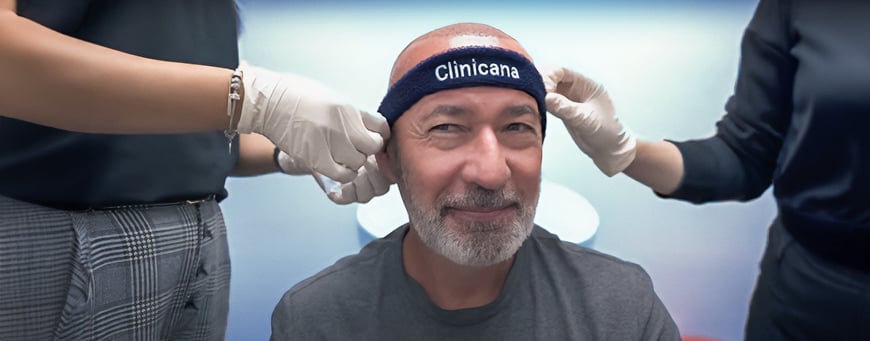Pimples on head: causes and treatment
Pimples on the head can appear for many reasons, although they are usually caused by the same hormonal imbalances that trigger the appearance of acne; it is an aesthetic problem more common than usually believed; and since it occurs on scalp, it can even cause hair loss.
We have received inquiries from people who are interested in the cost of a hair transplant, asking us questions such as “How to prevent pimples on head?” because they have friends of family with this condition. So, what if you have pimples on your head? In this article we are going to answer the most common questions about this problem: what are its consequences for scalp, and what are the solutions available. Burt first of all, lets take a look at the causes of pimples on hear or scalp.
Why do I get pimples on my head?
Let’s start from the beginning: Why do I get pimples on my head? Although one of the most common causes for the appearance of pimples on scalp is acne – something associated with periods such as puberty, pregnancy, etc. – the truth is that pimples can appear in anyone and at any age, since in addition to hormonal imbalances, there are other triggering causes.
The appearance of painful and itchy pimples can significantly alter daily life. Its appearance is caused by a response of our immune system, which reacts to an infection by triggering an immune response, causing the inflammation and formation of pus that usually characterises acne pimples. It is advisable to always go to a specialist, who will determine the causes and the most appropriate treatment.
Many people who suffer this problem tend to think that it’s a minor problem and – since pimples can’t be seen with the naked eye – that they should not worry about it. However, the appearance of pimples can cause – if not treated properly – hair loss; in addition, pimples can be a symptom of a more serious disease. In summary, we can say that pimples on head can appear due to the following causes:
- Hormonal imbalances: it is undoubtedly the most common cause; these changes in the levels of certain hormones can be caused by pregnancy, puberty, menstruation, or by certain diseases.
- Inheritance: it has been observed that the risk of suffering this problem increases if there are members of our family who also suffer from it.
- Environmental changes: sudden changes in environment, for example going from intense cold to very hot, weaken skin and follicles, and increase infections risk.
- Allergies: consumption of certain medicines or foods, besides some chemical substances, can generate an immune response and trigger the appearance of pimples.
- Stress: stressful situations or periods throw off hormone levels, and may cause pimples to appear on head.
- Hygiene problems: lack of hygiene, but also an excess of it (for example, washing your hair too often) can cause pimples to appear.
- Damage to scalp: using accessories on head that cause wounds or tighten hair, as well as other bad habits that damage the hair, cause infections and pimples.
- Sebum: an excess of sebum on scalp clogs follicles, causing infections and the appearance of pimples.
- Autoimmune diseases: this type of diseases, often chronic, cause imbalances in the immune system, which can attack follicles causing inflammation and infections.
Types of pimples
Pimples on head, like pimples on face, can manifest themselves in many different ways; depending on whether pimples are stuffed with blood, pus, sebum, water, etc., we will be facing symptoms with different causes and, therefore, we will have to apply different treatments. In general, we can find the following types of pimples:
- Red pimples: a red pimple on head can be a response to an allergic reaction to some type of chemical used on hair; so, it is advisable to consult a doctor.
- White pimples: a white head pimple is normally stuffed with pus, and thus manifest an infection on scalp; these are the most common type of pimples, and tend to be very itchy.
- Dry pimples: this type of pimple appears due to ailments such as chickenpox or seborrheic dermatitis. Since they are dry, their appearance is similar to that of a scab.
- Sebum pimples: these are pimples that contain sebum; therefore, if left untreated, they can cause an infection. They are usually caused by hygiene problems, and are painful.
- Water pimples: unlike dry pimples, these ones are stuffed with water. They can be a symptom of a dermatitis, an allergic reaction, or even chickenpox.
How to reduce pimples on head
We have seen what types of pimples are there, and what causes them; but, what is the treatment for pimples in head? Although in many cases you may resort to a simple home treatment for head pimples, in other cases a proper head pimples treatment will require to consult a doctor and a prescription drug. Let´s see what to do if you have pimples on your head:
- Use cleansing wipes: there are special acne wipes that are usually sold in pharmacies, and that help to relieve symptoms and reduce acne because they contain salicylic acid.
- Avoid scratching: we must avoid the temptation to scratch pimples, no matter how itchy they are, since by doing so we will damage skin and aggravate the infection.
- Do not use oily shampoos: when choosing a shampoo for pimples on head, it should be an oil low shampoo, preferably water based.
- Use creams with retinoids: these are creams that are applied to scalp to prevent follicles obstruction. They are effective, but need a prescription by a doctor.
- Use antibiotics: like the previous remedy, this also requires a medical prescription. They are used when patient does not respond to other remedies; they can be oral (tetracycline) or topical (gel).
Although the appearance of pimples on head is not a serious health problem, we recommend to consult a specialist to examine our case and avoid complications, such as hair loss. If hair implants become necessary, they can only be performed once pimples have been properly treated. Clinicana is the best hair transplant clinic in Turkey, and we are specialised in all hair treatments: request your free consultation, and ask for a free, no obligation estimate for your treatment.

A hair transplant procedure can be a transformative experience. But to ensure your newly implanted follicles thrive, proper aftercare is very essential. This article equips you with key hair transplant recovery tips or post-operative instructions to minimize discomfort, optimize healing, and pave the way for a successful hair transplant journey for you. Hair transplant recovery […]

Dreaming of a full head of hair? Hair transplants are gaining traction, particularly in Turkey as clinics there are characterized by budget-friendly options and skilled surgeons. But, with so many clinics, the way of choosing the right one can be overwhelming. This article will help you find one of those top 10 hair transplant clinics […]

Finding the best hair transplant clinic in Istanbul is a crucial decision. In this article, we will look at some important factors to help you make an informed decision to ensure a successful surgery. How to choose the best hair transplant clinic in Istanbul? Istanbul has emerged as a sought – after destination for hair […]








